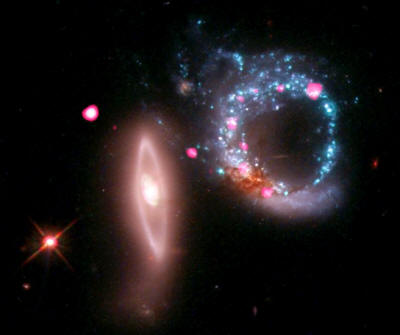|

by Mel Acheson
August 16, 2011
from
Thunderbolts Website

Interacting galaxy
pair Arp 147.
Credit: X-ray: NASA/CXC/MIT/S.Rappaport
et al.
Optical: NASA/STScI
Today’s image is billed as a ring of
black holes. As such, it presents a fairy ring of gravitational
fantasies.
The first fairy dances a fantasy of Redshift-is-Proportional-to-Distance,
overlooking half a century of
contrary evidence. That puts the ring
far away. For the ring to appear as bright as it does, a second
fairy must dance a pas de deux of
Super Luminosity.
Giant Ring of Black Holes
To get that much energy from the feeble
force of gravity, a third fairy must support the others with the
Dance of Great Mass.
Since the ring is constrained by the Assumption of Equivalence of
Mass and Matter, a fourth fairy must squeeze in - and be squeezed to a
supernatural density. She (or he, we can’t tell at these densities)
can’t dance but can only quiver and quake. When the other fairies
bump into her, she does emit X-rays. The ring is the result of the
crowded stage and the bumping.
Fairy rings and fantasy dances are entertaining, but when a theory
requires this much supernaturalism, it would be wise to question
assumptions. Astronomers no longer see what’s there but gaze with
incurious enchantment upon artists’ impressions of obsolete
hypotheses.
The radiant energy and its pattern,
-
of distribution indicates the
action of electricity, not gravity
-
of plasma discharges, not mass
-
of pinch and double layer effects, not density
-
of instabilities in
a circuit, not collisions and mergers
In other words, it’s an
entirely natural event, no super-sizing needed.
-
In the first place,
Arp 147 is located in the
ejection cone from
M31. The “super-luminal” radio
galaxy 3C120 is only a few degrees
farther along. (As an ejection from M31, the galaxy would be nearby
and its super-luminal jet would have a normal velocity for a plasma
discharge.)
Arp 147 is likely another high-redshift
ejection from M31: 400 thousand light-years would be a better guess
for its distance than 400 million. Its radiant energy would be 3
orders of magnitude less than what the second fairy is dancing for.
-
In the second place, an abundance of energy is available. The ring and the galaxy to the left that
supposedly bumped it would be components in the same ejection
current from M31. They are loads in the intergalactic circuit and
dissipate only a small part of the total current. Much more energy
will be flowing through them to drive other components (galaxies)
farther along the circuit.
-
In the third place, Arp 147 is likely the galactic equivalent of the
rings around the axis of
SN1987a. As the current pinches down in
typical
hourglass form to power the galaxy to the left, variations
in the plasma push the individual filaments of current into glow
mode. Double layers accelerate the current carriers, and they emit
ultraviolet and x-ray radiation.
As “mass and gas” astronomy pirouettes to ever more fanciful dances,
plasma astronomy describes a natural history of electrical
phenomena.
|

